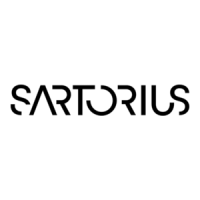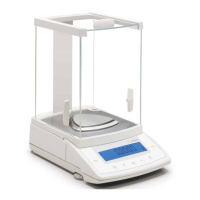Do you have a question about the Sartorius CPA 8201 and is the answer not in the manual?
General safety guidelines for operating the balance to prevent damage to equipment and ensure user safety.
Instructions related to safety during installation, including voltage checks and cable connections.
List of components included with CPA2P and CPA2P-F models.
Components supplied with various CPA, GCA, and GPA balance models based on readability.
Guidelines for handling the balance during storage and shipping to prevent damage.
Procedures for unpacking, checking for damage, and acclimating the balance.
Information about the control seal on verified balances for legal metrology in the EU.
Step-by-step instructions for installing CPA2P, CPA2P-F, and balances with analytical draft shields.
Steps for correctly positioning and securing the draft shield on balances.
Procedure for connecting CPA26P, CPA225D models to their electronics box.
Steps for connecting the balance to AC power, including safety precautions.
Identification and explanation of the balance's display and operating elements.
Explanation of the basic weighing function's utility, features, and EU legal metrology requirements.
Specific guidance for operating microbalances like CPA2P and CPA26P.
Initial setup, power connection, display indicators, and taring procedures.
Specific instructions for filter weighing on the CPA2P-F model.
Information on the port for below-balance weighing and steps for analytical/microbalances.
Explanation of calibration/adjustment, EU legal metrology requirements, and features.
Detailed steps and menu codes for performing internal calibration and adjustment.
Step-by-step guide for performing external calibration and adjustment.
Automatic calibration and adjustment features, including temperature ranges.
How to open the Setup menu and navigate its options for balance adaptation.
Instructions on how to print current balance settings from different menu levels.
Overview of weighing-related parameter settings, including filters, accuracy, and calibration.
Setup and selection of various application programs like Counting, Weighing in Percent.
Configuration of parameters for applications like Counting, Animal Weighing, and weight units.
Settings for data interface and printout options for weighing.
Settings for printing application data, extra functions, and menu reset.
Procedures for entering up to 8 characters to identify measurement series.
Steps to set the time and date for ISO/GLP-compliant records.
How to adjust the display brightness level on the balance.
Explanation of function keys (F, CF) and their use within application programs.
How application programs are selected and values indicated on verified balances.
Overview of the Net-total Formulation program, its purpose, features, and menu code.
Examples of printouts showing component and total weights, tare, and net weight.
Overview of the Counting program, its purpose, features, and function keys.
Procedures for changing, storing, and updating the reference sample quantity.
How to configure and use a reference balance for enhanced counting accuracy.
Steps for preparing the counting program and examples of printouts.
A practical, step-by-step example demonstrating the counting process.
Overview of the Weighing in Percent program, its purpose, features, and function keys.
How to change and store the reference percentage for weighing in percent.
Steps for preparing the program and examples of printouts.
A step-by-step example demonstrating how to determine residual weight in percent.
Overview of the Animal Weighing program, its purpose, features, and function keys.
How to change and store the number of subweighing operations.
Steps for preparing the program and examples of printouts.
A step-by-step example demonstrating animal weight determination with automatic start.
How to configure the "Toggle Weight Units" application and use the (F) key to switch units.
Explains the generation of printouts for documentation, including line format and application parameters.
Information on generating ISO/GLP-compliant printouts and configuring printout settings.
Examples of printouts with and without data ID codes, and auto print examples.
Parameters for GLP header/footer, menu codes for ISO/GLP records, and function key usage.
Examples of lines included in ISO/GLP compliant printouts for general use and calibration.
Details on the interface port, its features, factory settings, and non-verified digit identification.
Details on 16-character output format, special codes, and error codes used in data output.
Explanation of the 22-character output format, including ID codes and unit symbols.
Detailed meanings of special codes and error codes used in data output.
Displays two formats for control commands and lists command characters and their meanings.
Importance of matching parameters and explanation of handshake modes for data transmission.
Configuration of automatic data output and options for faster output speeds.
Details of interface connectors, male connector specifications, and warnings for RS-232 cables.
Detailed pin assignments for the interface connector.
Diagram showing the connection between balance and peripheral device using RS-232C/V24 protocol.
Table listing display errors, their causes, and suggested solutions.
Troubleshooting for constant weight readout changes, incorrect readings, and preparation for transport.
General cleaning guidelines for the balance and its components, including stainless steel surfaces.
Procedures for safety checks, power supply inspection, and contacting service.
Guidelines for disposing of packaging, equipment, and batteries, and information on Sartorius's take-back program.
Detailed technical data for the CPA2P and CPA2P-F balance models, including weighing capacity and dimensions.
Comprehensive technical specifications for various CPA, GCA, and GPA balance models across multiple pages.
Technical data for OCE/PCE variants across different CPA/GPA/GC model series.
Technical data for high-capacity CPA models and other series.
Various accessories including printers, displays, battery packs, and AC adapters for balance operation.
Specialized kits, software, weighing pans, calibration weights, and draft shield chambers.
Accessories for connectivity, including draft shield covers, data cables, adapters, and T-connectors.
Accessories for specialized weighing and handling, such as remote controls, hangers, bowls, and dust covers.
Details on directives, EC verification, and legal metrology requirements for weighing instruments.
The official EC Declaration of Conformity document for Sartorius weighing instruments.
Information regarding EC Type-Approval Certificates for specific weighing instrument models.
Specific details from the EC type-approval certificate, including model numbers and validity.
Illustrations of balances showing key markings and types (BC BL, BD BL, BF BL).
Explanation of the symbols used on the plates (CE, M, S, MD, T).
Examples of model designation plates and descriptive plates showing verification status and temperature ranges.
| Maximum Capacity | 8200 g |
|---|---|
| Readability | 0.1 g |
| Calibration | External |
| Display | LCD |
| Repeatability (Std. Dev.) | 0.1 g |
| Linearity | ±0.2 g |
| Interface | RS-232 |
| Pan Size | 190 mm |
| Power Supply | AC Adapter or Battery |
| Stabilization Time (typical) | 2 seconds |











